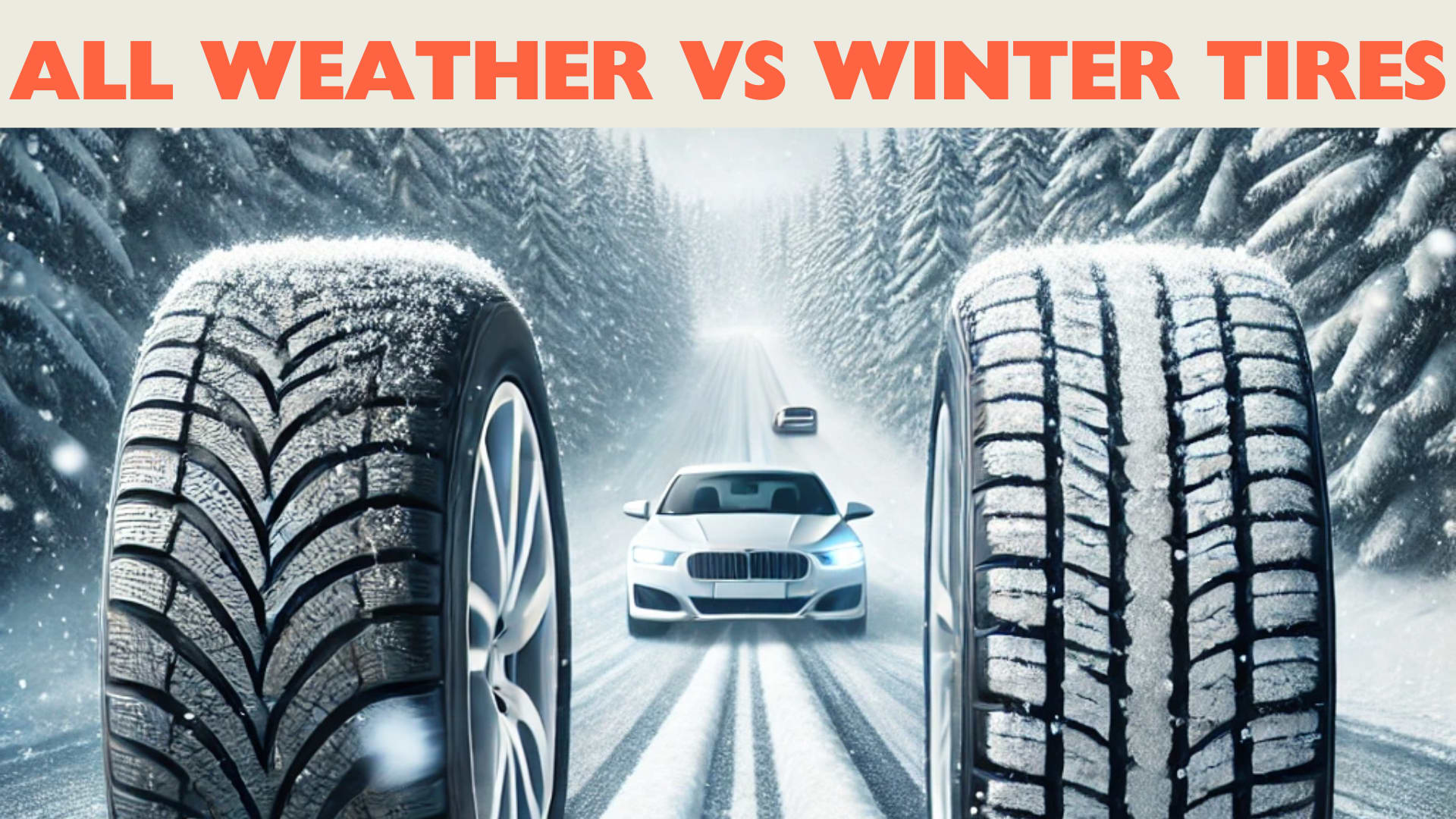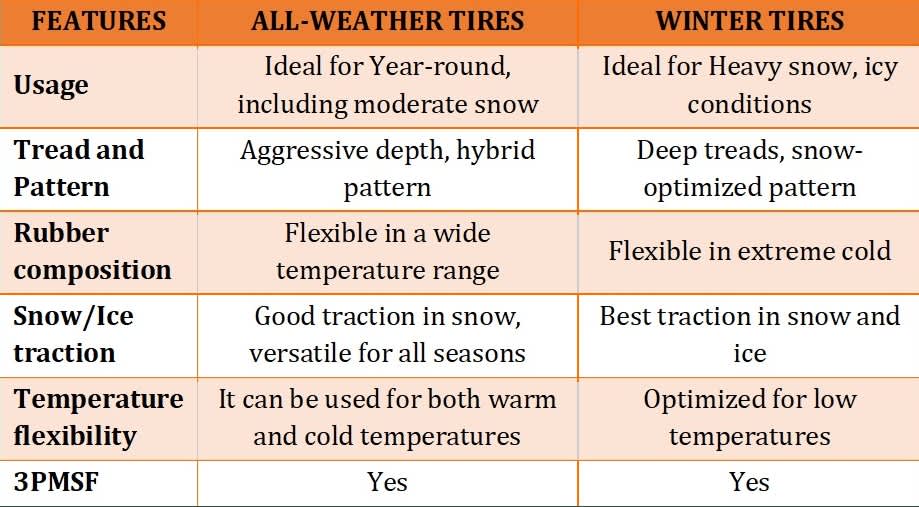Compare
Free shipping
Best price guarantee
SimpleCrew exclusive savings
0% financing options
Tire replacement coverage
24/7 roadside assistance
Easy returns

If you’re a driver in a part of the country that has harsh winter weather and snow, slush, and ice that stays on the ground and the roads for weeks at a time, you probably have already found out that there’s no substitute for winter tires in that kind of weather. But if you only need winter tires for a month or so, is it really worth it to invest in a set?
It’s all going to come down to your vehicle, your driving habits, your climate, and your needs. If you’ve got to deal with tough winter weather but try to stay home when it’s that nasty outside,maybe you can get by with all-weather tires. But if you have no choice but to get out and about when the snow flies, winter tires might be the only thing that gets the job done for you.
So let’s take a little deeper dive into this subject and break down the pluses and minuses of each type of tire, relative to your needs.
The difference between winter and all-weather tires

Let’s go back a few decades. Before the mid 1970s, drivers in places like New England or the upper Midwest would have to take off their car’s tires and swap them for the noisy, heavy, clunky “snow tires” or “mud grips” that you might have seen on the back of your dad’s Ford Country Squire wagon. Then of course when springtime came around again, the snow tires came off and the highway tires went back on again.
Goodyear saw that this was a headache for a lot of drivers and introduced the Tiempo, the first all-season radial tire. What a great idea – a tire that drivers could use year-round without the hassle of switching. Sales took off and, before long, other companies were having to play catch-up. Today, the all-season tire is by far the biggest selling category in the tire business, but all-season tires are a compromise since they deliver good traction year-round…in everything but heavier snow. That’s where the all-weather tire comes in.
All-weather tires are designed with a more aggressive tread pattern, a different tread formulation, and different design of grooves and sipes for the kind of winter traction that earns the tire industry’s Three Peak Mountain Snowflake certification for severe winter service. That means they have a pretty significant edge over all-season tires in terms of winter traction without giving away too much in terms of ride quality, noise level, vibration/harshness, long wear and handling.
But for all the winter-traction strengths that all-weather tires offer, they still don’t deliver the same kind of performance in deeper snow, slush, or ice that winter tires do. Winter tires have significant differences from all-season or all-weather tires:
- Winter tires use a specialized tread formulation that stays flexible at subfreezing temperatures for enhanced traction (think about a hard rubber hockey puck on ice vs a flexible, supple rubber boot)
- The tread compound of some winter tires is designed to actually repel water and slush
- Tread grooves of winter tires are wider and deeper and are actually designed to retain packed-in snow, which helps augment traction
- Winter tires use a denser network of sipes, the hair-thin grooves that run laterally or at an angle to the tread grooves, to provide hundreds of extra biting edges to claw through snow and slush
- Some winter tires are pre-drilled with small holes for easy installation of plastic or metal studs to get through ice and the worst winter conditions (studs are not legal in all states and are only legal for certain months in others – check your state laws to be sure)
So when it comes to the worst winter weather, winter tires have a distinct leg up on all-weather tires – but they also come with some distinct drawbacks, which we’ll touch on in a moment.
Winter vs all-weather tires fuel economy
When it comes to fuel economy, all-weather tires are likely to have the advantage. The more pliable rubber of winter tires and their winter tread pattern means increased rolling resistance, so it takes more energy to get your vehicle going and more energy to keep it going down the road. It’s more than just rolling resistance, though – winter driving often means a lot of stop-and-start episodes along with wheel spin and often, short drives where the car’s engine never warms up to operating temperature. None of that is good for fuel economy.
Many all-weather tires, on the other hand, are designed for low rolling resistance like their all-season cousins. Their tread pattern, construction and rubber formulation are substantially different from winter tires and don’t come with the extra friction that hurts fuel economy. But for all these reasons and more, most drivers can expect a 10-20% hit in fuel economy in tough winter weather.
ADVANTAGE: All-weather tires
Winter vs all-weather tires in rain
When it comes to rain, this is pretty much a tossup. Both winter and all-weather tires are designed with grooves that channel water away from the tire’s footprint to avoid hydroplaning effect in standing water, meaning wet-weather traction is pretty good with either winter or all-weather tires. Our caveat here, though, would be temperature; a wet road means that temperatures are presumably above freezing, and winter tires are not designed for warmer temperatures (which we’ll get into in a bit).
ADVANTAGE: Tossup
Winter vs all-weather tires in snow

Kind of a no-brainer here. Everything about winter tires is designed for improved traction (acceleration, braking, cornering) and performance in snow and slush. The sipes, the grooves, the tread pattern, and the softer, squishier tread formulation are all purpose-built to safely get you through roads with deep snow and slush. All-weather tires might have the Three Peak Mountain Snowflake symbol, but they’re not designed to be able to safely handle snow that’s more than a couple of inches deep. The advantage here goes to winter tires, hands-down.
ADVANTAGE: Winter tires
Winter vs all-weather tires tread life

Now we come to tread life. All-weather tires are designed to be used year-round, and usually come with a tread life warranty that’s comparable to that of an all-season tire (anywhere from 40,000 to 80,000 miles). Winter tires are not designed to even be used when temperatures are above 40-45 degrees; their softer tread compound isn’t designed for warmer weather and dry roads, and will wear quickly (and invalidate your warranty). Consequently, most winter tires don’t feature a tread life mileage warranty. Winter tires also tend to handle poorly on dry roads, with that softer rubber transmitting a squishy feeling through the steering wheel.
When it comes down to tread life, no question that all-weather tires have the advantage.
ADVANTAGE: All-weather tires
When to use each

How nasty does the winter weather get where you are? If snow gets two or three inches deep and doesn’t last for more than a few days at a time, you can do fine with all-weather tires. If you’re in a place like Oregon, Maine, or Minnesota and you might experience several inches of snow (along with ice, God forbid), winter tires are probably the only thing that will safely get you around without putting your car into the ditch. And if there’s a chance of icy roads, winter tires that are studdable are the only solution (if staying home isn’t an option).
Which one should you choose?
That’s a question that comes down to how hard your winter weather is, what your needs are, what your budget is, and what kind of vehicle you drive. If you regularly have to contend with severe weather in the winter and you don’t mind the expense of winter tires (and the hassle of having to swap tires and store the ones that aren’t on the vehicle), then winter tires are what you probably need.
If winters get a little rough but not terrible, then all-weather tires will give you the boost in winter traction that you can’t really get with all-season tires, and you have the extra benefit of being able to leave them on your vehicle year-round.
Whatever type of tires you need and whatever you drive, we’re confident that you’ll find what you need at SimpleTire, and at a price you’ll love!
Ready to find the perfect tires?
Search By